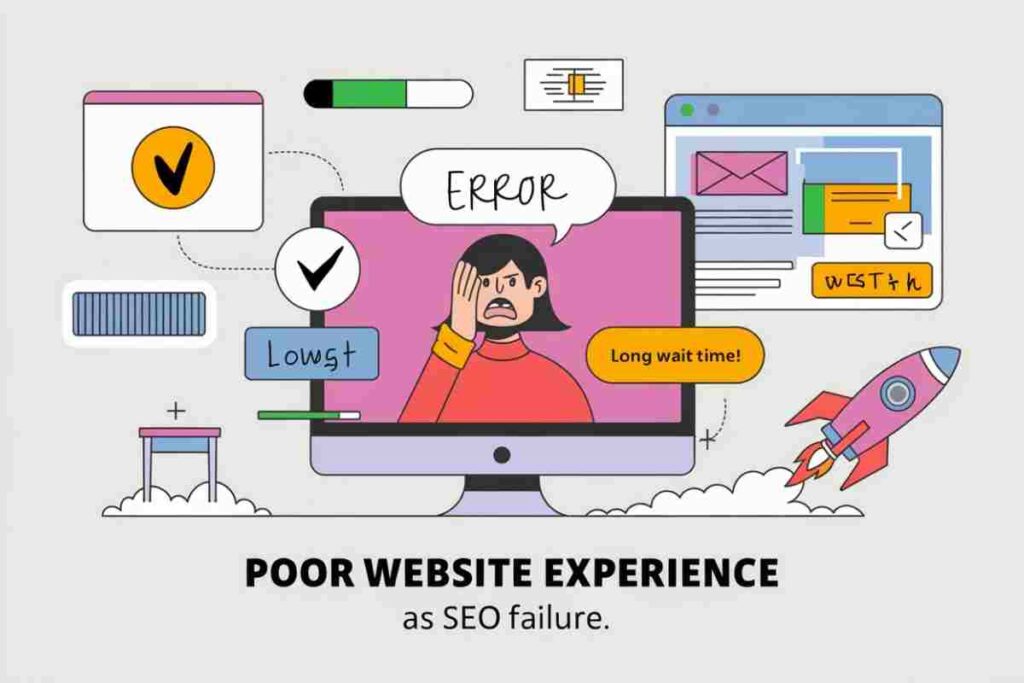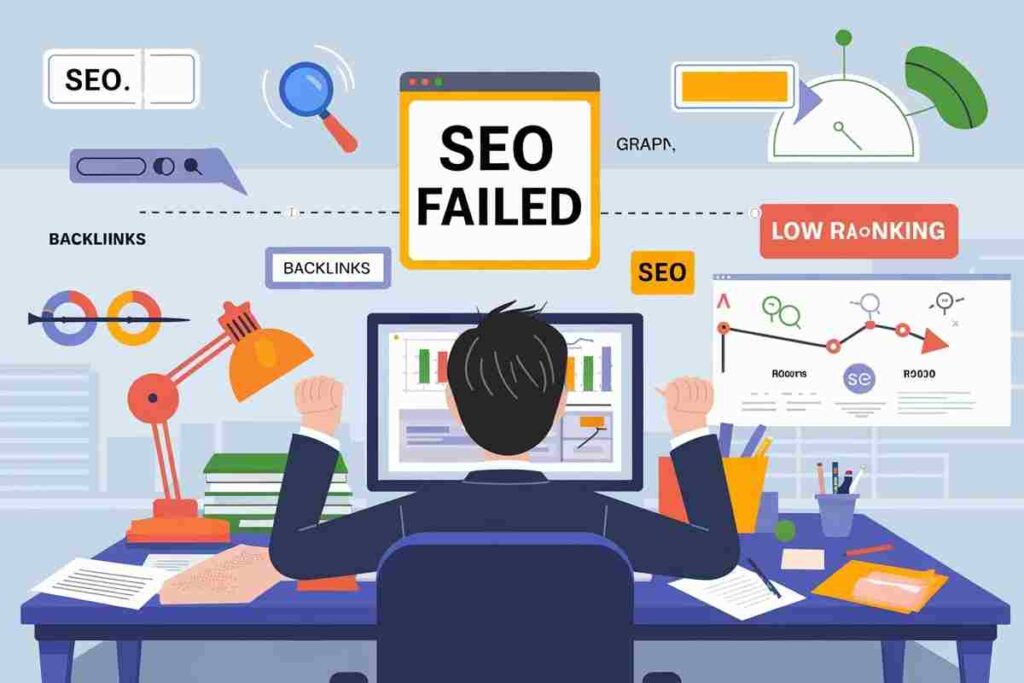Search Engine Optimization (SEO) is an essential part of digital marketing that can drive organic traffic, increase brand visibility, and improve user engagement.
However, many SEO campaigns fail to deliver the desired results. Understanding why SEO fails is key to avoiding these pitfalls and making the necessary adjustments to achieve long-term success.
In this article, we will explore the most common reasons why SEO fails, provide actionable solutions, and offer best practices that can help your SEO campaigns thrive.
Why SEO Fails: Poor Website User Experience

User experience (UX) plays a critical role in SEO performance. Google’s algorithms prioritize websites that provide a seamless experience for users, rewarding those that make it easy to navigate, load quickly, and find valuable content.
Unfortunately, many businesses focus heavily on technical SEO factors, like backlinks and keywords, without considering the importance of UX. This oversight can severely impact rankings and user engagement.
Common Signs of a Poor User Experience
- Increased Bounce Rate: If visitors leave your site quickly, it indicates that they didn’t find what they were looking for.
- Low Average Session Duration: Users are not staying on your site long enough to engage with content, possibly due to confusing navigation or slow page load times.
- Decreased Page Views per Session: If users aren’t browsing multiple pages, it could indicate that your site’s structure or content isn’t compelling enough.
How to Fix It
- Simplify Navigation: Ensure that all pages are accessible within three clicks from the homepage.
- Improve Visual Design and Layout: Make sure that your website is visually appealing, with clear calls to action.
- Prioritize Mobile Experience: With mobile-first indexing, it’s crucial to have a responsive design that works well on both desktop and mobile devices.
Slow Website Load Speed
Website speed is a critical SEO factor that many overlook. Research shows that 1 in 4 users will abandon a website if it takes more than four seconds to load.
Google also considers site speed a ranking factor, and slow websites tend to experience poor performance in search results.
How to Fix It
- Use Page Speed Tools: Tools like Google PageSpeed Insights, GTmetrix, and Lighthouse can help diagnose issues affecting site speed.
- Optimize Images and Media: Compress images without losing quality, and use next-gen image formats (like WebP).
- Implement Caching: Set up proper caching to reduce load times for returning visitors.
Using Black Hat SEO Techniques
Black hat SEO techniques are strategies designed to manipulate search engine algorithms and boost rankings in ways that violate search engine guidelines.
These tactics may work in the short term, but they can result in penalties, which may completely de-index your website from search engines.
Common Black Hat SEO Practices
- Keyword Stuffing: Overloading content with keywords to an unnatural extent, making the text unreadable.
- Cloaking: Serving different content to search engines than to users.
- Paid Link Schemes: Purchasing backlinks from link farms, which can harm your site’s credibility.
How to Fix It
- Avoid Manipulative Practices: Focus on providing valuable, user-focused content and adhering to Google’s Webmaster Guidelines.
- Engage in White Hat SEO: Invest in ethical SEO practices, such as creating high-quality content, earning backlinks naturally, and focusing on user satisfaction.
Why SEO Campaigns Fail: Poor Content Structure
One of the most overlooked reasons SEO campaigns fail is poor content structure. While many focus on backlinks, keyword optimization, and other technical aspects of SEO, a disorganized content structure can hinder your efforts.
A well-structured page makes it easier for both users and search engines to navigate the content, which can ultimately improve SEO rankings.
The Importance of Content Structure for SEO
Search engines, like Google, use algorithms to crawl and index your website’s content. They rely heavily on the organization of your content to understand the topic, relevance, and hierarchy of your page. Poor content structure confuses search engines and can lead to lower rankings.
A page that is hard to follow or doesn’t have clear headings and subheadings will not only frustrate users but also fail to convey the intended information efficiently to search engines.
Key Elements of Well-Structured Content
Header Tags (H1, H2, H3, etc.)
Using appropriate header tags is essential for organizing content. The H1 tag should clearly state the main topic, while H2 and H3 tags should break the content into logical sections and sub-sections. This helps both users and search engines understand the importance of different parts of the page.
Bullet Points and Lists
Bullet points and numbered lists are great for breaking down complex information and making it more digestible. This not only improves user experience but also helps search engines understand key points.
Multimedia Elements
Images, videos, and infographics can significantly enhance the readability and engagement of your page. Make sure multimedia is relevant and optimized for both speed and accessibility.
Internal Linking
Proper internal linking not only guides users through related content on your site but also helps search engines understand the relationship between different pages on your website. This can improve overall site indexing and navigation.
Benefits of Proper Content Structure
Improved User Experience (UX)
Content that is well-organized and easy to read will keep visitors on your page longer. Reducing bounce rates and increasing time spent on the site can significantly impact your SEO rankings.
Higher Engagement
A structured page is easier for visitors to scan, which can increase engagement metrics like clicks, shares, and comments. These factors indirectly influence your search rankings.
Better Crawlability and Indexing
Search engine crawlers use content structure to prioritize and index your pages. A page with clear headings and well-organized content makes it easier for these bots to crawl and understand your site, improving your SEO performance.
Incorrect Link Building Strategies

Link building is a cornerstone of SEO. However, not all backlinks are equal. Low-quality or irrelevant backlinks can harm your website’s SEO efforts.
It’s essential to focus on earning high-quality backlinks from reputable sources rather than using shortcut tactics like link farms or footer links.
Common Link Building Mistakes
- Low DA (Domain Authority) Links: Links from low-authority websites offer little SEO value.
- Nofollow Links: These links don’t pass any SEO value to the linked page.
- Footer Links: Links placed in footers are often considered spammy and can hurt rankings.
How to Fix It
- Focus on Quality Over Quantity: Target high-authority websites in your niche for backlinks.
- Build Relationships: Engage with industry influencers, guest post on reputable blogs, and contribute valuable content to earn organic backlinks.
Lack of Audience Understanding
A successful SEO strategy isn’t just about technical optimization; it’s also about creating content that resonates with your target audience.
If you don’t understand your audience’s needs and preferences, your content will fail to capture their attention.
How to Fix It
- Conduct Audience Research: Use tools like Google Analytics, surveys, and social media insights to understand your audience’s behavior and interests.
- Create Buyer Personas: Develop detailed personas to guide your content strategy and keyword targeting, ensuring you’re speaking to the right people.
Ineffective Keyword Targeting
Keyword research is a foundational element of SEO, but many businesses make the mistake of targeting overly competitive or irrelevant keywords.
While ranking for a competitive keyword like “best pizza” may be challenging, it may not align with what your audience is truly searching for.
How to Fix It
- Focus on Long-Tail Keywords: Long-tail keywords are less competitive but can attract more qualified traffic.
- Match Keywords to User Intent: Understand the intent behind a user’s search (informational, transactional, etc.) and tailor your content accordingly.
- Keyword Research Tools: Use tools like SEMrush, Ahrefs, and Google Keyword Planner to identify the best keywords for your business.
Why SEO Fails: Mobile Optimization Issues

With over 60% of searches now originating from mobile devices, mobile optimization is essential for SEO success. Google’s mobile-first indexing means that your website is ranked based on its mobile version, not the desktop version.
Common Mobile SEO Issues
- Non-Responsive Design: Websites that don’t adapt to different screen sizes will have poor performance on mobile devices.
- Slow Load Speed on Mobile: Mobile users expect fast-loading pages, and delays can hurt both UX and rankings.
How to Fix It
- Ensure Responsive Design: Make sure your website adapts to mobile screens seamlessly.
- Optimize Mobile Speed: Use tools like Google Mobile-Friendly Test and PageSpeed Insights to check and improve your mobile website performance.
What to Do When Your SEO Campaign Fails
If your SEO campaign isn’t yielding the desired results, don’t panic. SEO is a long-term strategy, and failures are common, especially when experimenting with new tactics. Here’s what to do when your SEO efforts aren’t working as planned:
Audit Your Website
Perform a thorough audit of your website to identify technical issues, user experience problems, and gaps in your content.
Hire an SEO Consultant
If you’re struggling to identify the root cause of your SEO failure, consider hiring an SEO consultant who can provide expert guidance and strategy adjustments.
Outsource to an SEO Agency
For businesses that lack the time or expertise to manage SEO internally, hiring an SEO agency can be a great solution. They can handle everything from keyword research to content creation and link building.
Conclusion
Understanding Why seo fails and addressing common issues proactively is crucial for achieving online success.
By focusing on user experience, avoiding black hat techniques, building quality backlinks, and targeting the right keywords, you can significantly improve your website’s SEO performance.
Remember that SEO is a continuous process that requires consistent effort and adaptation. Implementing the fixes and strategies discussed in this article will help ensure that your SEO campaign is successful in the long run.
By following these tips and ensuring that your SEO efforts align with current best practices, you’ll be on the path to improving your rankings and driving valuable traffic to your site.
FAQS
What are the main reasons of Why seo fails?
SEO fails due to poor website user experience, slow loading speed, black hat techniques, bad keyword targeting, and ineffective backlink strategies.
How does website speed affect SEO?
Slow websites lead to higher bounce rates, lower engagement, and can directly harm your rankings since Google values fast-loading pages.
What is black hat SEO and why should it be avoided?
Black hat SEO uses unethical tactics like keyword stuffing or cloaking to manipulate rankings, which can result in penalties or de-indexing by Google.
Why is mobile optimization important for SEO?
Google’s mobile-first indexing means websites that aren’t optimized for mobile devices may rank lower, affecting both SEO and user experience.
How can keyword research impact SEO success?
Keyword research ensures you target relevant, high-volume terms that match search intent, improving your chances of ranking higher on search engines.
Why do backlinks matter for SEO?
Backlinks from authoritative sources signal trust to Google, boosting your site’s credibility and search rankings when they are high quality.
How can a poor user experience affect my SEO?
Poor UX, like slow load times and difficult navigation, increases bounce rates and reduces engagement, negatively affecting SEO performance.
What should I do if my SEO campaign is failing?
Audit your website for technical issues, review content and backlinks, and consider consulting an expert to refine and optimize your strategy.



